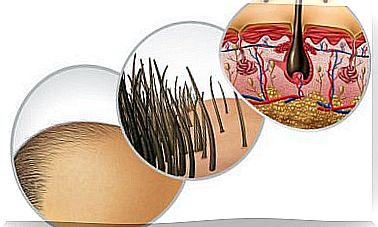What It’s Like To Live With Anorexia Nervosa
People who don’t know what it’s like to live with anorexia nervosa don’t have the ability to understand what it means to fight this disorder. It is important to know what its impact is and what consequences it can cause.
It is very difficult to understand what it is like to live with anorexia nervosa when the physical and emotional consequences it causes are unknown. However, taking the experiences of many patients as a reference, a single conclusion is drawn: it is hell.
The disease goes through a series of phases that can be decisive for treatment. However, since most do not accept their condition and try to hide it, many cases are only detected when they reach a stage where the consequences are serious.
The most worrying thing is that the mind becomes a potential enemy of the patient, since it prevents him from seeing beyond the problem he is experiencing. Then, self-destructive behaviors develop that, unfortunately, sometimes have fatal outcomes.
What is anorexia nervosa?
Anorexia nervosa is, along with bulimia, one of the most common and dangerous eating disorders. It occurs when the person becomes obsessed with losing weight, reaching a point where they cannot stop, even when their weight is reduced dangerously.
It greatly affects women, especially between the ages of 17 and 22. However, it can be developed by anyone, even during childhood. The disease is characterized by causing a distorted image of the body and obsessive behaviors.
In an effort to control weight, the person makes strict dietary restrictions or uses purging methods such as vomiting or ingesting laxatives. Although in this sense it resembles bulimia, they are not the same. In bulimia, the patient cannot stop eating and uses purging to feel less guilty.
Living with anorexia nervosa
Although patients with anorexia acquire behaviors that break any concept of healthy nutrition, the disease is not about food. Rather, it is a way of dealing with emotional problems, almost always linked to self-esteem.
The origin of the disease combines social, biological and mental factors; however, neither the sick person nor their family members can understand it when it is developing. Why is living with anorexia nervosa so difficult?
Anorexia doesn’t start with trying to lose weight, but rather with the realization that, at some point, there is nothing you can do but lose weight. The obsession with being thin is so great that any sacrifice seems valid.
But beyond wanting to achieve a “perfect” body, there are a series of hidden emotions and traumas that make treatment difficult. In addition, the patient does not see the problem with the same eyes as someone around him and, therefore, refuses to accept it.
Consequences of anorexia nervosa

Lack of emotional support is one of the hardest things about living with anorexia nervosa. Although the denial of the disease gives rise to part of the behaviors that characterize it, its lack of understanding is what allows it to progress to dangerous phases.
If the anorexic does not have someone to help him detect the disorder without prejudice, the consequences are worse. When a family member, friend, or acquaintance judges you for your condition, they do little or nothing to help you .
So, phrases like “at your age with this nonsense”, “do you have no head?” or “don’t you know that if you don’t eat you die?” they are counterproductive in these cases. What are the consequences of living with anorexia nervosa?
1. Psychiatric disorders
The ability to concentrate decreases and the tasks of greater cognitive demand are more exhausting. Thinking slows down (bradypsychia) and there is often an attention deficit. But without a doubt, the most noticeable thing is that a distortion of body image and weight is generated.
2. Mood swings
In most cases the mood changes long before developing the disease. However, part of living with anorexia nervosa is experiencing ongoing irritability, loss of appetite, and anxious and depressive symptoms.
3. Skin problems
Nutritional deficiencies take their toll and are noticeable in the condition of the skin, nails and hair. The activity of the sebaceous glands decreases and there is a loss of fat that makes the skin look dry. In addition, hair loss increases and edema appears.
4. Heart failure
Low weight coupled with poor nutrition impairs myocardial contraction and leads to hypotension. Consequently, the risk of sudden death increases.
5. Endocrine disorders
Uncontrols of antidiuretic hormone secretion affect endocrine activity. In turn, the menstrual period is altered and sometimes disappears completely (amenorrhea); the breast tissue also atrophies.
6. Other consequences
- Impaired intestinal motility and constipation
- Sleep disorders
- Lack of sexual appetite
- Loss of bone density
- Electrolyte abnormalities, such as low levels of potassium, sodium, and chloride in the blood
- Suicidal thoughts
Hopelessness comes to invade people who get used to living with anorexia nervosa. The constant relapses with the treatment and not being able to control that fear of gaining weight seem an impediment to overcome it. However, with the strategies of a team of health professionals and family support, little by little it can be left behind.









